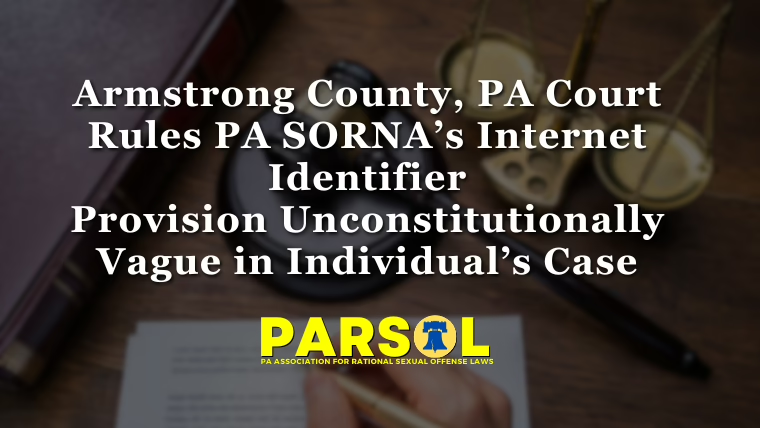December 22, 2021 has seen the release of many case opinions from the PA Supreme Court (SCOPA) with Commonwealth v. David Santana being the biggest win for our advocacy efforts. In a 5-2 decision, SCOPA affirmed the Superior Court’s opinion that “Mr. Santana’s registration requirement under SORNA was an after-the-fact punishment, and therefore unconstitutional. Accordingly, he had no duty to comply with those requirements and his conviction for ignoring them, under 18 Pa.C.S.A. § 4915.1(a)(3) [failure to provide accurate information], was a manifest injustice and must be overturned,” Commonwealth v. Santana, 241 A.3d 670, 662 (Pa. Super. 2020) (en banc).
Mr. Santana committed his offense in 1983 in New York. He had to register with New York’s “Sex Offender Registration Act” (“SORA”) when it became effective in January of 1996. Pennsylvania’s “Sex Offender Registration and Notification Act” (“SORNA”) took effect December of 2012. Mr. Santana moved to PA in 2015. He initially registered with the Pennsylvania State Police and continued his duty register in-person but did not register his phone numbers, job, and social media account. For that, he was arrested and charged with failure to provide accurate information.
He plead guilty to the offense. On July 18, 2017, the trial court handed him a sentence of 2 years and 9 months to 5 years and 6 months in the PA Dept. of Corrections. On July 19, 2017 SCOPA ruled in Commonwealth v. Jose Muniz SORNA was punitive and violated the U.S. and PA Ex Post Facto clauses. The next day, Mr. Santana filed a motion to withdraw his guilty plea and to have the charges dropped. He too then made the same argument as Mr. Muniz but only to be denied relief by the trial court. He appealed to the Superior Court who ruled in his favor as cited above. The Commonwealth disagreed and appealed to SCOPA arguing that Mr. Santana shouldn’t be granted relief because his initial crime happened out of state, and he was given fair notice of his duty to register when he moved to PA.
Both the Superior and Supreme Courts relied on the Calder factors, Calder v. Bull, 3 U.S. 386 (1798). Calder was the first case to apply the federal Ex Post Facto clause. The four categories of law that are identified in Calder are:
1st. Every law that makes an action done before the passing of the law, and which was innocent when done, criminal; and punishes such action. 2nd. Every law that aggravates a crime, or makes it greater than it was, when committed. 3rd. Every law that changes the punishment, and inflicts a greater punishment, than the law annexed to the crime, when committed. 4th. Every law that alters the legal rules of evidence, and receives less, or different, testimony, than the law required at the time of the commission of the offense, in order to convict the offender. Calder, 3 U.S. at 390 (emphasis added).
The matter of Ex Post Facto isn’t where the crime was committed as the Commonwealth was trying to argue, but when. Mr. Santana’s crime was committed in 1983, 29 years prior to the enactment of SORNA.
The Superior Court recognized that the third Calder factor was the predominant factor in this case. They agreed with Mr. Santana that Muniz did apply to him hence relieving him of his obligation to register and vacating his conviction of failure to provide accurate information. I believe this opens the door for anyone who has had a conviction of failure to provide accurate information or failure to register under Megan’s Law I, II, III, and SORNA I overturned if their offense occurred prior to April 21, 1996, effective date of PA’s first Megan’s Law. Why? First, they wouldn’t have the obligation to register making the conviction an illegal sentence. Second, the conviction would be illegal because the statutes were unconstitutional in the first place. “An unconstitutional act is not a law; it confers no rights; it imposes no duties; it affords no protection; it creates no office; it is in legal contemplation as inoperative as though it had never been passed,” Norton v. Shelby County, 118 U.S. 425, 30 L. Ed. 178, 6 S. Ct. 1121 (1886). Any violations or convictions under an unconstitutional act should be overturned.
applaud our appellate system for seeing the injustice that was done and making the proper correction.
Superior Court Majority Opinion: https://www.pacourts.us/assets/opinions/Superior/out/j-e02005-19o%20-%20104579532116438419.pdf#search=%22Santana%20%27Superior%2bCourt%27%22
PA Supreme Court Majority Opinion: https://www.pacourts.us/assets/opinions/Supreme/out/J-66-2021mo%20-%20104994035155311768.pdf?cb=1




